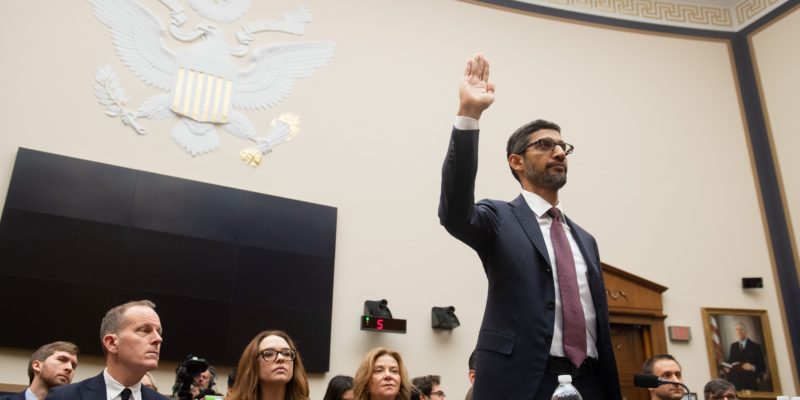The 13 months of investigation into antitrust claims against the world’s four largest tech companies culminated yesterday. The four Tech CEOs gathered in front of the US Congress to investigate one question: do they collectively have too much power and is that power damaging to citizens, companies, and themselves?
The heart of the problem: The internet has created a new kind of monopoly. Given big techs’ products are free, or in Amazon’s case very cheap, their monopoly power does not result in higher prices. Instead, it leads to corrosion of competition which can have dangerous implications for user privacy, misinformation, and democracy.
There was no shortage of issues for Congress to raise in relation to any of the companies. Here are the highlights:
Faced criticism over abuses of user data following its acquisition of DoubleClicks in 2007, the largest publisher-side digital ad platform at the time. Google had promised the government it would not merge its own user data with that of DoubleClick’s. However, in 2016 Google broke that promise, “essentially destroying anonymity on the internet,” according to Florida congresswoman Val Demings.
Congress said: “Isn’t it true that what changed between 2007 and 2016 is that Google gained enormous market power, so that while Google had to care about user privacy in 2007, it no longer had to in 2016?”, asked Demings.
Pichai: He repeated the company line that “users have control over how their data is used.”
Amazon
It was the first time the world’s richest man, Jeff Bezos, appeared before Congress. Washington congresswoman Pramila Jayapal launched the subcommittee’s central concern asking whether Amazon uses the data it collects from other sellers on the platform to ensure they can’t compete.
Congress: “You can set the rules of the game for your competitors, but not actually follow those same rules for yourself,” Jayapal said.
Bezos: “We have a policy against using seller-specific data to aid our private label business, but I can’t guarantee you that that policy has never been violated,” said Bezos.
Faced accusations relating to its buying of rivals, such as Instagram and Whatsapp, in order to “neutralise a competitor”.
Congress: “Facebook saw Instagram as a threat that could potentially siphon business away from Facebook. And so rather than compete with it, Facebook bought it,” Judiciary Committee Chairman Jerry Nadler said.
Zuckerberg: “With hindsight, it probably looks obvious that Instagram would have reached the scale that it has today, but at the time it was far from obvious,” he said, pointing out that the Federal Trade Commission approved the merger at the time.
The subcommittee chairman Rep. David Cicilline dismissed his comment noting that the “failures” of the FTC in 2012 do not mean antitrust laws were not violated.
Apple
Accused of abusing its position as a gatekeeper, especially in relation to the App Store. Democratic Rep. Lucy McBath pointed to evidence that rival parental control apps to Apple’s Screen Time were kicked out of the App Store for not meeting Apple’s safety requirements. Within six months, they were reintroduced with no significant privacy changes made.
Congress: “Of course, six months is truly an eternity for small businesses to be shut down, even worse if all the while a larger competitor is actually taking away customers,” said McBath.
Cook: He dismissed claims that Apple was deliberately crushing its competitors, citing “there are many reasons” why an app may not meet the App Store’s guidelines.
- The four companies’ combined annual revenue at last count was $773 billion US dollars. Together, their combined revenue adds up to roughly the GDP of Saudi Arabia.
- The antitrust investigation doesn’t seem to be slowing the tech giants down. For the first half of the year up until June 30, the five companies (the big four plus Microsoft) announced 27 deals, according to Bloomberg data, up 29% from the same period last year. This is the fastest pace of acquisitions since 2015.
- Rough estimates of the four companies’ combined market capitalization amount to a staggering 5 trillion US dollars.
What’s next: The investigation will produce a report which will be published by the end of the year. This will determine the basis of new laws to regulate big tech.









